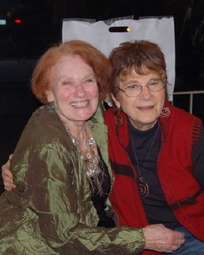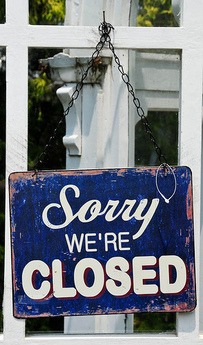 Corky and me on a happy day Once I wrote a piece about a day my girl friend, Corky, and I strolled toward Hayes Street. Spying a soggy but brightly colored cloth flower on the ground, I picked it up and offered it to her as a tribute, more or less. She often wore large colored cloth flowers. For whatever reason, she disliked this one. I held it awhile and let it drop somewhere along our walk. Later, when I wrote about it, I said the color was chartreuse. When she read what I said, she objected. I may have said it was a favored color of hers; but upon her request, I changed the color to lime green. That was not a difficult request to fill.
But this new request, to write something for her, coming almost a year since we stopped seeing each other is a little more difficult. When we talked a week or so ago after months of silence, she said, “You caused me pain when we broke up, so you should make amends and write something for me.
It’s my guess she should star in this story.
I don’t see why not. Once, our relationship inspired many of my stories, and I’d like to think I treated her with kindness though clearly the spotlight was on me. Listeners or readers could pick which one of us to identify with, yet in each piece was the faintest whiff of my rightness and, I suppose, the hint that she may have been somewhat wrong. Not a big wrong, but in my world of the story, wrong.
For example, I wrote about her finishing my sentences and how annoying I found this. Another time, I talked about her introducing me to her former college roommate as a writer and how I objected to the label.
So let me continue Corky’s story with my view of why this relationship didn’t work. No villains here. Only her childhood and mine, and particularly what we brought along well into our seventies. And I’m going to simplify it to one word: competitiveness. Here we’re dealing with competition so deep-rooted as to be uninteresting in the retelling.
Go with me instead to Corky’s front door on Castro Street in San Francisco one warm day in our past as I pick her up for an afternoon in Sonoma. She opens the door. She is wearing a kitchen apron and shorts. I feel a surge of anger. I have no ability to pause, to repeat silently “anger, anger, anger,” to peel it back and reach the hurt of what feels to me like being “one-upped.” WAAAA, as in “Want,” as in the opening chorus of “What about me? I can’t compete. I don’t stand a chance of being noticed.” I criticize her. I am ashamed to be seen with her; she should be more considerate of my feelings. That sets the tone for the rest of the day. She’s defensive. I can’t dictate what she wears, etc.
Then there’s the black tutu, the see through boots with the multicolored socks. The fabulous if sometimes elegantly mismatched jewelry, the pieces of knitting not intended to be anything but winding up really something with a button added.
No chance for this relationship as long as I argue with the reality of who it is that opens the door. Should Corky have to change to be loved?
While the months of separation passed, I learned from therapy and from listening to Tara Brach’s Dharma (Teaching Talks) that as soon as I wanted Corky to be different or to dress differently, I had closed my heart. As soon as “Should” took root in my mind and heart, in the moments I opposed the reality of who she is to get my historically unmet needs met, I could not be present or offer her love.
Now come forward in time to the dining room at Corky’s house last week. I want us to heal and revisit some of our issues with honesty. I hope I have no expectations.
Among all we talk about, she tells me she shopped at Kohls, thinking Vera Wang would be on the racks, but instead buying a Jennifer Lopez faux fur coat she is sure I will not like. It is apparently part of an eye-catching ensemble she wore to the theater in Berkeley. The first time she wore it, she told me a woman with a fashion blog wanted to take her picture in her faux fur and black beret.
Her message: You won’t like this because I still call attention to myself and love admiration. In our past you didn’t accept this about me.
My response: Put it on. I like it. You look adorable.
 Cerrado / Valerie Everett This piece still speaks for me although I gave it in 2009 from the lectern at the San Francisco Unitarian Universalist church because I got caught up in a familiar pattern of lashing out at my then girlfriend, Corky. And recently through meditation I have come to realize that between react and respond, it’s the pause that counts.
I’m guessing it would be better for everybody I know if I could see the light of reason before getting hot under the collar. I’d like to give myself a choice between reacting and responding rather than defaulting to react. I don’t want to be the queen of bounce back and jab, more apt to react than respond.
“React”- to do back. You point out a flaw, so I find a shortcoming. You act like you don’t know what I’m talking about, so I pretend you don’t make sense to me either. You yell at me, so I yell back.
On the very morning I ask the universe to provide me with a lesson, it arrives just as I lock the door to our place of business on Buckingham Way at about 10:30 a.m. and slide the closed sign into place. The receptionist begins to process the Weight Watcher meeting and because the computer program is new for us, we want to work without interruption. But two women are standing outside our locked door and appear to be staring at the door. I take in a deep breath, remembering what our trainers call “The Service Vision” and open the door. “Hello,” I smile warmly, wishing they would go away, prepared to tell them with the next deep breath that they can’t come in but are welcome to attend the next meeting. But before I say anything, one of the women explodes with, “Do I look like I need to lose weight?”
Ah ha, I smile to myself. Clearly, this is a reaction. For a minute I say nothing. What do I say now? Certainly not, “What is wrong with you?” That too would be a reaction. Perhaps she thinks she is being funny the way I sometimes think I’m being funny. So I ask her, “Are you being funny?” She says that she isn’t and then apologizes. Seems, she is super sensitive about appearing overweight. As for whether or not she is carrying a few or many extra pounds, I wouldn’t know because she is covered by a heavy coat. I continue to smile and introduce myself. She responds with her name. We shake hands. No harm. No foul. As we say in sports.
What makes “reacting” so much easier and quicker than “responding”? One theory has it that we have had every original experience we are ever going to have by the age of 19. From that time on, much of what we anticipate in the way of experiences will be based on memories of what went before. If you think 19 is a little young for every experience, the idea of recalling early experiences still has validity and helps explain to me why while watching a movie, my girlfriend, Corky, twitches, flinches or shudders at every loud screen sound. She doesn’t wait to find out if the plot warrants the flinch. Maybe movie scares were big in her childhood, and loud screen sounds continue to act as a trigger.
It sheds some light to think of reacting as reliving the past while responding is experiencing the present and thinking about how the future may result from how we behave. No wonder reacting is so much faster and familiar than responding.
For me, the difference between react and respond is more than just a powerful concept based on etymological differences. It’s an opportunity to see the light before reaching the end of the tunnel and having to look back at where I’ve been and what I’ve said or done and then having to apologize or regret that I didn’t make something new of the experience. Unless, of course, there is a train coming through that tunnel and my best recourse is to react. It’s usually not a matter of either/or, as much as it is of knowing the difference and choosing the wiser course of action. So here’s to less cursing the darkness and more lighting of candles
 Thuya Garden Path in Maine/Kate Kukro We’re lunging around the room at Regular Exercise – it really is a step up from a gym – and Ginna, my personal trainer, and I are not talking. Perhaps she assumes I am depressed because I don’t complain or make excuses. I follow instructions but stop to stare out a window whenever I feel like it. She wants to know what is the matter. ¿Estás bien? I confirm I am depressed. A good thing about Ginna? None of that “Come on, you can do it” crap. Of course we will do some of “it.” I pay for an hour of guided physical activity for the sake of endorphins and serotonin. This intermittent lunging will have to do even though vigorous exercise actually works better. But I’m not sure I want Ginna in this current welter of confusion and sadness. Depression doesn’t need reasons. Could just say it’s chemical or blame it on Dad’s genes. I’m lucky there is comfort and trust with Ginna. Often between lunges, when neither of us is especially depressed, we share our very different lives. And despite our differences, her youth, my age, her one young son, my three grown sons, her fairly recent arrival from Bolivia and my very long teaching career on the west coast, we have developed a rapport. She says our relationship is like hamaca, (hammock in English) in which we are held and comfortable, trusting the other. I feel the same. But I can’t hang out with Ginna all the time. She is responsible for muscles and joints, not confusion and sadness. Plus she is trying to build her clientele, and I can’t be endlessly exercising to make it worth her while. In addition to the hamoca we have together, I need my own place of safety, of comfort, and trust . In those moments, with partial sun streaking Clement and 15th Ave., with the sounds of digging up the street and the backward beep, beep beep of road maintenance, I don’t want to think or feel, just move and move, allowing calf muscles to ache and my sore shoulder to unstiffen. For the year has had me deep in thought and feelings. This December, a daughter-in-law gets hit by a car and dies instantly. A grandson goes back to the Philippines from San Francisco. In February, my oldest son packs his pitbulls in the car, loads up his computers and leaves his wife (and me) to live on the East Coast. About the same time in February, I opt out of a relationship to see a therapist rather than travel to Mexico with my girl friend on an Olivia cruise she paid for. Lots of confusion, sadness, and loss this year. Wanting that place of silence and safety, I turn to meditation. As a beginner, each day I set the timer on my meditation phone app to 20 minutes until the muffled singing of the sangha bowl says times up. I came to meditation through a link to the website of Insight Meditation teacher, Tara Brach in Bethesda, Maryland. Tara’s Dharma talks and meditations can be listened to at no cost. I’ve downloaded all the podcasts. In one of her talks, entitled “Equanimity,” she shares the concept of Querencia. It’s a Spanish word that connotes a haven and a sanctuary, a place of renewal and safety; it is the place in the bullring where the bull goes to gather his strength, to be renewed. And it is the matador’s job to keep the bull out of that spot. Multiple times I listened to “Equanimity,” wanting to hear again and again that word so I could begin to truly understand querencia as a place where I too could feel secure, a place within from which I might draw strength of character. It’s a powerful concept. And at this time in my own life, more than ever, I seek a place in the self where I know I am safe. Resting in that haven, I can allow feelings of sadness and fear. In silence I can accept that my son and four-year old granddaughter will cope with their loss together, even as I cope with mine. And I can breath into kindness for my daughter-in-law’s mother who has lost her only daughter and not judge or compete with her for “baby” time. Thus meditating, either sitting or walking, I experience querencia and strengthen my intentions to make relationships in which all are held in hamaca. I have yet to tell Ginna about adding querencia to her word , hamaca. Next time, between lunges, I can tell her.
 The Road Not Taken / Wildxplorer It’s Monday again and I like to post on Monday. Because of a recent loss in my family, I have not adventured into new writings. But this piece, although written about two years ago, talks about how things come into our lives and go from them. I still believe what I read when I wrote this piece that “we must hold everything lightly” while we give our experience our whole hearts and full attention. By the way, the girlfriend I mention no longer plays that part in my life, though she is certainly a fine person, but that’s yet another story I will tell.
Any reader of poetry probably knows that Robert Frost’s poem “The Road Not Taken” is about life choices. The poet mentions two roads diverging in a yellow wood; however, from my perspective, Frost was lucky to have discerned a mere two roads in the undergrowth, considering how often two ways to go understates the dilemma of actual life choices.
But before perambulating into my past to make a point about roads, the present compels me to say that no ruling or law should prevent some people from traveling a road they would choose if they could.
As for Frost, who am I to say that two roads did not diverge; I wasn’t there, but as metaphors for my life, two roads is too few. Many more options often presented themselves, and at times the road I actually traveled didn’t lie peacefully in the undergrowth but came up and hit me before I had time to figure out which path was covered by “leaves no step had trodden black.”
And it would be nice to say I always took the high road, but sometimes I trod the path of least resistance, and maybe like Frost’s road not taken that made all the difference, though maybe not.
Occasionally, someone would point me in a direction and say go that-a-way and I would go. That’s how I became the adviser for the Locke High school newspaper at the inner city school where I taught in the 70s. My department chair said do it and I did and that made all the difference because as a result my work became my play and I found a passion for picas, pixels, sports, a band director and a coach or two.
In college, before I even imagined teaching high school let alone sports writing, I thought I would be a writer like Joyce Carol Oates or Joan Didion. I would graduate from Occidental College, if I wasn’t suspended first for refusing to attend compulsory chapel. I thought I would go to Breadloaf School of English in Middlebury, Vermont. But in my sophomore year, the actual road I was traveling in the form of a freeway offramp in Pasadena came up to meet me as I was thrown from the car on a rainy evening returning to campus and broke in several places, requiring months of recuperation at home with a boyfriend carrying school work to my house and back again. The car accident itself, however, didn’t doom Breadloaf.
For weakened in spirit by my injury and feeling guilty for dating a fraternity brother of my boyfriend, I made it up to him for all his fetching and lack of kvetching about my treachery and was “with child” my junior year.
And so I married, a rut frequently fallen into in the early sixties. While I was tempted to make it on my own as a single mom, as a junior in college, told I could not attend classes pregnant and unmarried, I yielded to pressure.
I just have to interject that I wish marriage was a rut everyone could fall into.
Now, three sons later, and much later in life ambling hand in hand with Corky, also the mother of three sons, I marvel at our hidden worlds. Neither wholly rational nor irrational, with not every thought or impulse great or noble or coming from a calm center, we are teachers to each other. And I look at the roads that lie ahead, wherever they go and see they are incredibly precious.
Moreover, as the roads ahead become shorter than roads behind that led to now, I aim to avoid the dead-end of coulda/woulda/shoulda and cultivate instead an urgent delight because aging, a road we all travel, has taught me to calculate the value of experience not by how long it lasts, but how deep its impact.
So it was when our Monday Small Group Ministry met for the last time, we extinguished the chalice with these words from Buddhist and UU minister James Ishmael Ford: “We must hold everything lightly, for everything passes. But . . . such a holding is enough—when we give it our whole hearts, our full attention.” Traveling each road with “Whole heart and full attention” transforms the ordinary, reduces regret and turns every road into one that makes all the difference. It was not Robert Frost but James Ishmael Ford who said, “Our appreciation of even the smallest things in our lives is the very majesty and magic of our human existence.” Let it be so.
|




 RSS Feed
RSS Feed